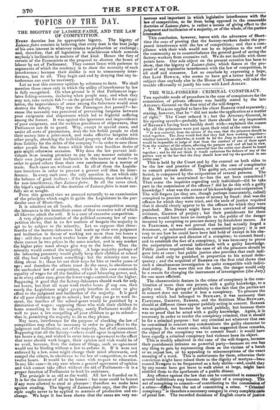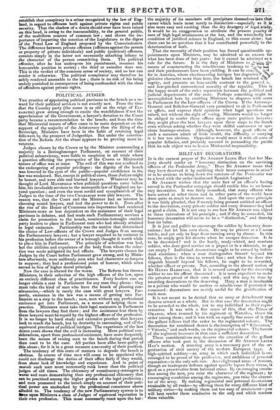effective bargains with . It was essential, from the nature
of the case, that the prisoners should be their money into a joint-stock, and make e tried together. The Jury would find that they had been working together— other people, absolving the individual property of the stockholders whether honestly or otherwise it would be for the Jury to determine ; and it from liability for the debts of the company ?—in order to save those would be impossible to judge Of that from the conduct of one of them apart other people from the losses which their own heedless desire of from the conduct of the others, affecting the purpose and end all had in view. gain might otherwise occasion. Why does the law prevent indi- • • • * Ile believed it to be essential that the entire case should be heard together ; and be did not think it would embarrass the defence of any of the viduals frcm issuing promises to pay in any manner suitable to their own judgment and inclination in this matter of trade ?—in parties now at the bar that the Jury should hear and try the question ia one entire case."
order to guard others from their own carelessness in a matter of This is held by the Court and by the counsel on both sides to trade. Such cases are without end. In all of them the Legisla- be the law and practice of England in the case of conspiracies ture interferes in order to prevent a greater evil than its inter- to commit private delicts. The guilty act, contemplated or ef- ference. In every such case, the only question is, on which side fected, is compassed by the cooperation of several persons. The the balance of good inclines : if for interference, then interfere; if first point to be ascertained is—has the act been committed ? for non-interference, then Laissez-faire. In all the cases cited, Then come the inquiries regarding each individual—did he take the bigot's application of the doctrine of Laissez-faire is most use- part in the commission of the offence ? did he do this with a guilty fully set at nought. knowledge ? what was the extent of his knowledge and cooperation ? From this general view we proceed naturally to an examination The will-forgers (as they are, though perhaps inaccurately, called) of the principles which ought to guide the Legislature in the par- conspired to procure certain sums of money by fraud : that was the ticular case of Short-time. offence for which they were tried, and the ends of justice required It is admitted on all hands, that excessive competition among that it should clearly appear to be the offence for which they were the labourers is the immediate cause of that excessive toil of which punished. Mrs. DOREY might have been convicted of suborning all likewise admit the evil. It is a case of excessive competition. evidence, GRIFFIN of perjury ; but their punishment for these establish that conspiracy is a crime recognized by the law of Eng- lend, in regard to offences both against private rights and public security. That the shadow of a doubt should ever have been raised on this head, is owing to the inaccessibility, to the general public, of the multiform sources of common law ; and shows the im- portance of imparting the sanction of the Legislature to the digest of the Penal Law of England proposed by the Commissioners. The difference between private offences (offences against the person or property of private individuals) and public (political) offences, consists simply in the latter not necessarily attaching infamy to the character of the person committing them. The political offender, after he has undergone his punishment, resumes his honourable position in society ; the thief or swindler does not. This is the verdict of the common sense of society, and no law can render it otherwise. The political conspirator may therefore be safely rendered amenable to the law ; there is no risk of his being unduly punished in consequence of being confounded with the class of offenders against private rights.



























 Previous page
Previous page